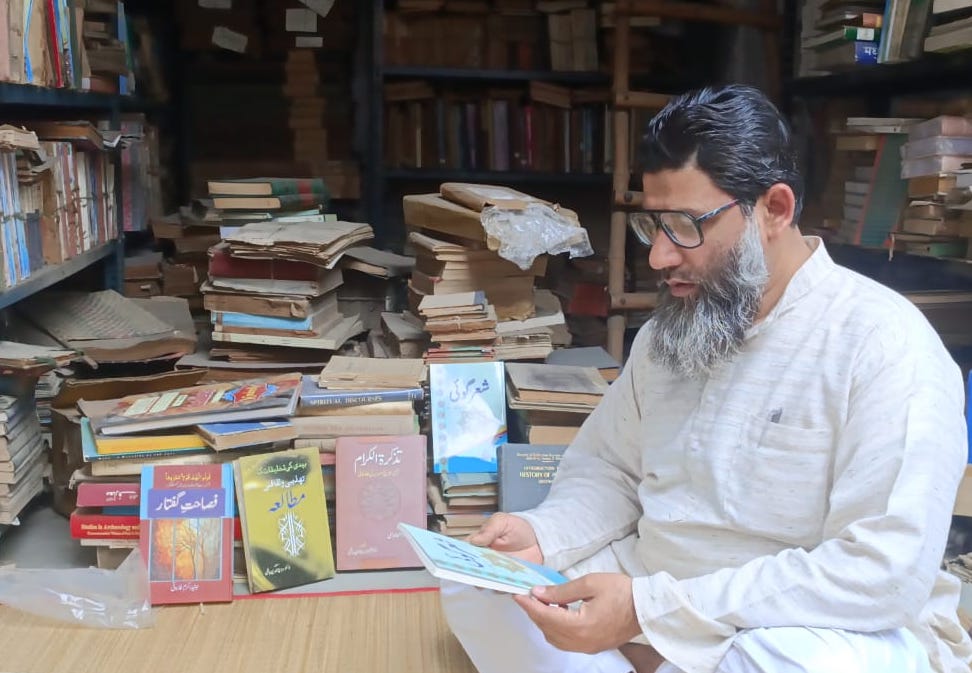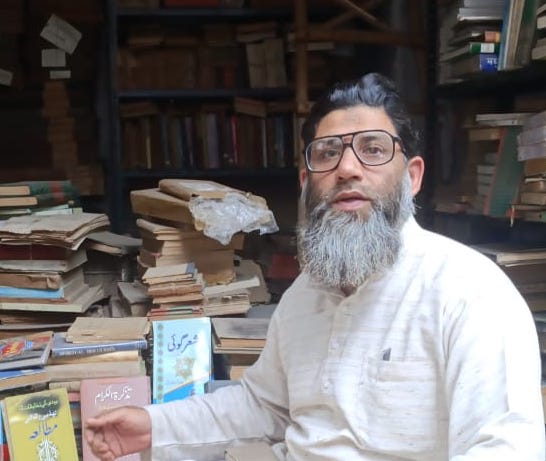Interview - Anwar Samadani

Anwar Samadani has been carrying out his father’s legacy of running a rare books store in Amroha. Established in 1958, the National Book Depot, Guzri, continues to preserve and promote rare books.
Anwar is a resident of Gher Pachaiyya, Amroha.
1. What do books mean to you?
A book is a faithful and reliable companion who never leaves you. It doesn’t take away your secrets; it shares its secrets with you. And as a popular Arabic adage goes, ‘Books are the best friends for solitude’. Books lessen your problems in their own ways.
2. You’ve been carrying on a family tradition of dealing in books. How has been the journey so far?
My father, Toufique Ahmad Qadri Chishti, started the National Book Depot and Book Binding on 18th December 1958. It housed second-hand educational course material from class one to B.A., sourced from Lala Laxmi Narayan. My father was also a binder and the only student of Haji Riazuddin Alvi (hakim phool walay). His binding services became popular, and even banks approached him for their book of accounts. In 1963, the shop’s name was shortened to National Book Depot, and it started collecting rare books full-time. He also advertised in newspapers to reach out to people who were willing to part with such books. The store soon became a centre of research and intellectual gatherings.
My father supplied many things to various Indian libraries, including the National Archives, Raza Library, Khuda Bakhsh Library, Maulana Azad Library, the one in JNU, Zakir Husain Library, and museums such as the National Museum and others in Allahabad, Kushinagar, Himachal, and Chandigarh.
3. What kinds of books do you’ve in your collection?
As you know, we are a rare books store, so our collection reflects that aspect. The titles in Urdu include Tarikhe Dehli, Al Biruni, Ek Zamindar ki Beti (a translation of Durgesh Nandini), Oud Hindi (a collection of letters by Mirza Ghalib), and Tarikh-e-Hindostan. In Hindi, we’ve books like Haider aur Tipu and Bible Darpan. The titles in English include Introduction to the History of History, History of Greece, and Human Origins.
4. How do you select books for your store?
I look primarily for the writer, year of publication, and the period the book covers. Sometimes people put up their entire personal libraries on sale. I then sort and select the ones that I want to keep, and the rest go away to be recycled.
5. Do people bargain on the price of books? Does it bother you?
Bargaining happens all the time. Sometimes, it’s tough, but people rightly expect value for their money.
6. The print industry is struggling globally today. Did you ever think of starting another venture?
In today’s digital environment, the value of books has gone down. An author first writes a book, then goes for composition and publication. After putting in so much effort, he comes across a PDF document of his book floating on the internet. This hurts his chances of selling the book, and at times he waits for people to visit him for a signed copy. It is dangerous for the publication industry.
7. Do you have any fond memories of customer interactions at the Amroha store or incidents related to the National Book Depot?
Most customers are impressed when I highlight a defect in a book. However, they may not buy it but leave the store on a positive note with this genuine approach.
National Book Depot made headlines on 5th April 1969, when my father discovered a manuscript of Diwan-i-Ghalib written by the poet in Bhopal. This copy gained international fame as the Nuskha-e-Amroha. He found another rare manuscript, Asrariya Kashaf-e-Sufiya, by Syed Muhammad Kamal Sambhali Wasti, a grandson of Hazrat Shah Wilayat who migrated to Sambhal. It describes the Sufi saints of Amroha and Sambhal. He supplied it to the National Museum, possibly around 1983. The newspaper Baazgasht, published from Amroha, carried this news.
In 1992, my father discovered a 10kg tamra-patra (copper plate with inscriptions) from the reign of Nagabhata II in Sambhal, UP. The Sanskrit text highlighted the ancient name of the city. On my father’s invitation, a few ASI officials visited our house in Amroha to inspect this new finding. Reports on it were later published in numerous journals and newspapers. The plate is now in Prayagraj.
8. What role do you see for National Book Depot in the foreseeable future?
I can’t say anything right now.
Anwar Samadani in conversation with Inam Abidi Amrohvi. (April 3rd, 2024)

